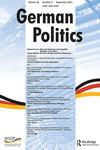From Private Wrongs to Public Rights: The Politics of Intersex Activism in the Merkel Era
IF 2.1
3区 社会学
Q2 POLITICAL SCIENCE
引用次数: 3
Abstract
During the Merkel era, Germany moved from a traditional gender binary to a gender triad by introducing a third sex category. Why did a nation that has historically lagged on gender issues become the first country in Europe to take this extraordinary step? This article sheds light on changing LGBTQI discourses in Germany and the successful politicization of intersex concerns. Initial reform was prompted by transnational social activism at the UN and top-down international pressure, while the second phase was dominated by competition among German domestic parties and the courts. I process-trace policy-making throughout the Merkel era to show how claims by intersex activists morphed from the private to the public sphere. Once the issue gained visibility, most political actors expressed support for social movement claims for physical inviolability framed as human rights. Semi-autonomous medical authorities resisted change, however, and maintained a correction paradigm that discursively came to be perceived as a ‘private wrong’. As a result, the state's legal recognition of a third sex preceded the ban of invasive medical procedures on intersex children. Recent far right anti-gender discourses have challenged these achievements and tried to limit the visibility of and broader accessibility to a third sex category.从私人错误到公共权利:默克尔时代的双性人激进主义政治
在默克尔时代,德国通过引入第三性别类别,从传统的二元性别转变为三元性别。为什么一个在性别问题上历来落后的国家成为欧洲第一个迈出这一非凡步伐的国家?本文揭示了德国LGBTQI话语的变化以及双性人问题的成功政治化。最初的改革是由联合国的跨国社会行动主义和自上而下的国际压力推动的,而第二阶段则由德国国内政党和法院之间的竞争主导。我处理了整个默克尔时代的政策制定过程,以展示双性活动家的主张是如何从私人领域演变到公共领域的。一旦这个问题变得引人注目,大多数政治行动者都表示支持社会运动将人身不可侵犯性视为人权的主张。然而,半自治的医疗当局拒绝改变,并保持着一种纠正模式,这种模式后来被认为是“私人错误”。因此,在禁止对双性儿童进行侵入性医疗程序之前,该州对第三性的法律承认。最近的极右翼反性别言论对这些成就提出了挑战,并试图限制第三性别的可见性和更广泛的可及性。
本文章由计算机程序翻译,如有差异,请以英文原文为准。
求助全文
约1分钟内获得全文
求助全文

 求助内容:
求助内容: 应助结果提醒方式:
应助结果提醒方式:


